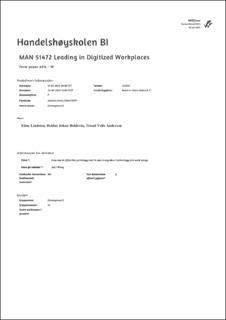| dc.description.abstract | Our term paper explores the impact of artificial intelligence (AI) on the pathology role and work design. We aimed to identify the challenges faced by pathologists due to increased workload and longer waiting times for test results and explore the future of the pathology role and the implications of AI.
The workload of pathologists has increased significantly in recent years. This has raised concerns about patient safety. Pathologists collaborate with various internal and external stakeholders, including other departments, patients, and hospitals. Interviews with pathologists indicate that the most challenging aspect of the job is the workload, while the most rewarding aspect is helping patients.
We also explored the future role of pathology and the changes that are expected to occur in the field. Pathologists expect changes in their roles, responsibilities, tasks, and competencies. They also expect changes in internal and external collaborations. The most challenging aspect of the future role is adapting to new technologies, while the most rewarding aspect is improving patient outcomes.
Like most professions, pathologists have limited experience with AI, but they expect it to change fundamental aspects of their role. They believe AI can improve diagnostic quality. However, they also see challenges in integrating AI into their work and overcoming barriers to implementation.
We conclude with an action plan for AI-driven job crafting for pathologists. The plan includes closing the trust gap, establishing collaborative efforts, empowering pathologists to influence their future job demands, and promoting peer learning and sharing success.
Overall, we believe this study provides valuable insights into the challenges faced by pathologists and the potential impact of AI on the field. It highlights the need for pathologists to adapt to new technologies and collaborate with internal and external stakeholders to improve patient outcomes. | en_US |
